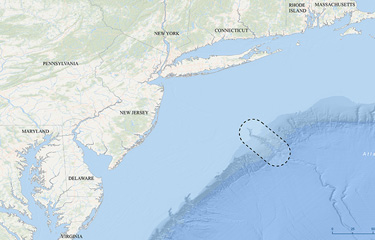A new marine sanctuary off the U.S. Northeast has been proposed by the administration of U.S. President Joe Biden, part of a suite of measures related to public lands announced 8 June.
The Hudson Canyon, the largest submarine gorge off the U.S. Atlantic at up to 2.5 miles deep and 7.5 miles wide, lies about 100 miles offshore of New York Harbor and runs 350 miles through the edge of the continental shelf.
The waters are home to federally protected whales, turtles, deep-sea corals, the scene of commercial, and recreational pelagic fisheries. The sanctuary proposal raised alarms among U.S. East Coast longline fishermen, who worry it could restrict the regional swordfish and tuna fishery.
“Hudson Canyon's grand scale and diverse structure – steep slopes, firm outcrops, diverse sediments, flux of nutrients, and areas of upwelling – make it an ecological hotspot for a vast array of marine wildlife,” the National Oceanic and Atmospheric Administration said in a press release.
Under the National Marine Sanctuaries Act, NOAA can open a public process “to designate and protect areas of the ocean and Great Lakes with special national significance.” Sanctuary designations have goals including conservation of marine wildlife, habitat, and cultural resources, promoting sustainable uses, expanding ocean science and monitoring, and providing for long-term management.
The 8 June announcement starts the process with a public scoping process through 8 August. A series of online public sessions and two in-person hearings in the U.S. states of New York and New Jersey will collect public input on potential sanctuary boundaries, marine resources and what protections they may require, and how the area should be managed.
The Hudson Canyon was originally nominated as a national marine sanctuary in 2016 by the Wildlife Conservation Society, with a petition that cited the canyon waters’ benefits to the public for food, recreation, and clean water.
Earlier national marine sanctuaries, such as Stellwagen Bank in Massachusetts Bay, 25 miles from Boston, Massachusetts, U.S.A. have been outlined to protect fishing, whale and wildlife watching activities, and historic shipwrecks frequented by recreational divers.
The regulatory reach of sanctuary designations does not go as far as marine monuments, which can be designated by U.S. presidents under the Antiquities Act.
The Northeast Canyons and Seamounts Marine National Monument off southern New England was designated by then-U.S. President Barack Obama in 2016 as the first and only one in U.S. Atlantic waters. That designation controversially brought a planned phase-out of some commercial fishing within the monument boundaries – a measure marked for reversal under the administration of former U.S. President Donald Trump but reinstated by Biden in 2021.
The American Sword and Tuna Harvesters, a group of commercial pelagic fisherman, said a Hudson Canyon sanctuary designation could set a course for a similar conflict again.
“Simply put, a commercial fishing ban in the Hudson Canyon has the potential to cause the collapse of the East Coast commercial fishery,” the group said in a statement. “This is another disappointing action from an administration that claims to be committed to science, working families, and communities. But it is unfortunately not out of character. “[In June 2021], our attempts to arrange a meeting with Interior Secretary Deb Haaland to discuss the harm to our fishers from reimposition of a commercial fishing ban in the Northeast Canyons and Seamounts Marine National Monument were rebuffed. Although acknowledged by staff via email, a terse, tardy, and condescending reply, did not come until January 2022, six months later, and three months after the ban was reimposed.”
Under the Biden administration’s climate policy, NOAA officials say they are “pursuing a holistic approach to curbing greenhouse gas emissions and building resilience to climate change and its impacts, including by conserving and restoring ocean and coastal ecosystems.” That includes expanding the network of national marine sanctuaries.
The administration has given its support to the so-called “30 by 30” initiative promoted by ocean environmental groups, seeking to “conserve, protect and restore” 30 percent of ocean waters under national jurisdiction by 2030.
The first in-person scoping hearing on Hudson Canyon is scheduled in New York City 19 July, followed by a hearing 21 July 21 in West Long Branch, New Jersey.
Reporting by Kirk Moore
Image courtesy of NOAA







